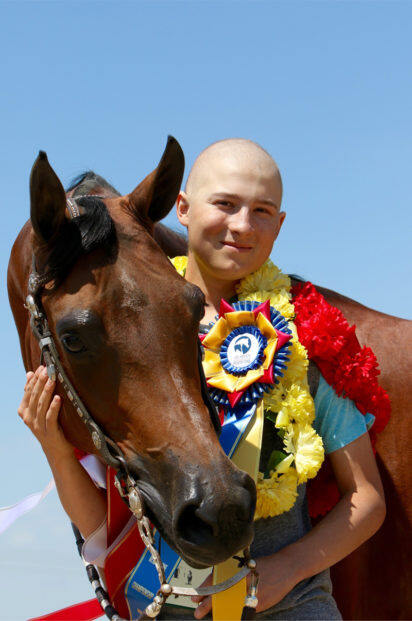Source: University of Southern California
IF YOU WERE ONE of the millions who watched the Rose Parade in January, you might have caught sight of a unique equestrian procession from the Arabian Horse Association.
The horses were part of Warrior Horses for Warrior Kids, a nonprofit that pairs horses with children who have cancer. For every $1,000 the nonprofit raises for the Leukemia and Lymphoma Society, a “warrior kid” is connected to the rider or owner of an Arabian horse. That child gets to meet and visit with “their” horse. Warrior kids might also receive photos, show schedules and even a horseshoe or a lock of horsehair.


The nonprofit was the brainchild of Ryan Melendez, a USC Dornsife College of Letters, Arts and Sciences senior from Valley Center, California. He got to walk alongside the horses during the 2020 Rose Parade with one of the warrior kids. Captain of USC’s Western Equestrian team, Melendez was inspired to start the organization after his own experience facing cancer.
Just a few days after starting his senior year at Valley Center High School, the competitive golfer, award-winning equestrian and guitar player developed a fever that he couldn’t seem to shake. After a few anxious days, his family rushed Melendez to the hospital, where his organs started to shut down and his body went into septic shock. Doctors diagnosed him with acute lymphoblastic leukemia and immediately put him on intensive chemotherapy.
During the difficult and painful time, Melendez found moments of happiness with horses. “I’d always go out to see my horses as a therapeutic way of dealing with what I was going through,” he told KTLA-TV.
As he got better, he hoped to share that joy. He launched Warrior Horses for Warrior Kids in 2017 to give other children facing cancer a chance to build a special bond with a horse. The nonprofit also raised more than $500,000 for pediatric cancer research, earning him recognition as the Leukemia and Lymphoma Society’s “2017 Man of the Year.”
Over the past three years, the group has matched several children with Arabian horses and Melendez continues to witness the healing bond. “I think what it does for [the kids] is similar to what it did for me,” he said. “It allowed me to escape the walls of the hospital and get my mind off the treatment I was going through. I could have a day to be normal again. And it’s not only beneficial to the warrior kid — their entire family can come out to the ranch and have a great day for everyone.”
For more information, please contact University of Southern California.








































